|
|
|
Sort Order |
|
|
|
Items / Page
|
|
|
|
|
|
|
| Srl | Item |
| 1 |
ID:
183409
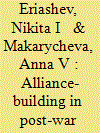

|
|
|
|
|
| Summary/Abstract |
Although great powers may forge ad hoc coalitions to attain their short-
term goals, this does not diminish the role of long-term strategic alliances.
The alliance theory has long become a separate strand of IR. However,
most scholars have focused more on external rather than internal threats
to account for alliance choices. The authors review the existing literature
on the formation of alliances and, shifting the focus to the struggle for
power between internal political actors, propose a theory that explains the formation of asymmetric alliances. By extending support to friendly
political groups, great powers can build alliances with those countries
where the elites are facing formidable opponents. On the contrary, leaders
who rule unchallenged have little incentive to rely on external patrons.
The article examines the cases of postwar Italy and Yugoslavia to test
the proposed hypotheses. The conclusions drawn from the analysis help
formulate recommendations that can be used by Russia in its current
strategic environment.
|
|
|
|
|
|
|
|
|
|
|
|
|
|
|
|
| 2 |
ID:
183408


|
|
|
| 3 |
ID:
183411


|
|
|
| 4 |
ID:
183407


|
|
|
| 5 |
ID:
183406
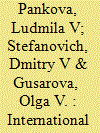

|
|
|
|
|
| Summary/Abstract |
In the coming decade, intensifying competition between great powers will
have a significant impact on the development of space activities (SA) and
on the future of international cooperation in this field. The article examines
the scope, development paths and competitive advantages of individual
countries in the field of space activities, and explores fundamental issues
of competition and cooperation. A system analysis method is used to
assess current dynamics in this area. The U.S. is expanding cooperation
with its allies, while Russia is strengthening cooperation with China in the
SA field. We note the “securitization” of SA development processes and
emphasize the expansion of the “space” dimension of the international
security agenda. There is a danger that “natural competition” may turn
into “confrontation,” which is a key factor influencing, inter alia, the need
to change the form of organization, the principles, the strategy, and the
mechanisms of international cooperation. The article also substantiates the
need to strengthen the role of international cooperation in the SA field as
a “binding” component of global security.
|
|
|
|
|
|
|
|
|
|
|
|
|
|
|
|
| 6 |
ID:
183404
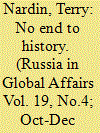

|
|
|
| 7 |
ID:
183410


|
|
|
|
|
| Summary/Abstract |
This paper studies North Korea’s official narrative on the Second World War.
The country is extremely autocratic, meaning that the only allowed vision
is the one prescribed by the state. This vision was initially imprinted by
the Soviet Union in the late 1940s. However, the official narrative on the
Soviet-Japanese War, which led to the establishment of the North Korean
state, has been rewritten: today Pyongyang credits Japan’s defeat to Kim
Il-sung and his “Korean People’s Revolutionary Army”—an organization
which never existed in reality. This article traces the evolution of the North
Korean false narrative and concludes that each of its pages was farther away
from historical truth than the previous one.
|
|
|
|
|
|
|
|
|
|
|
|
|
|
|
|
| 8 |
ID:
183400


|
|
|
| 9 |
ID:
183412


|
|
|
|
|
| Summary/Abstract |
Russia’s official position regarding the prosecution for violations of
International Humanitarian Law (IHL) in international criminal courts
changed during the 1990s and the 2000s. The article studies the reasons
for these changes by reviewing works of Russian experts. The performance
of the International Criminal Tribunal for the former Yugoslavia (ICTY) had
a negative impact on Russia’s position. Russian experts questioned the
impartiality of the ICTY and its effectiveness in preventing such crimes and
reconciling the parties.
Russia’s position has also changed with regard to the International Criminal
Court (ICC). In 2000, the Russian Federation signed the Rome Statute that
established the ICC, but withdrew its signature in November 2016. One
of the reasons for that decision was the participation of Russian troops
in armed conflicts outside of the Russian Federation and outside of UN
peacekeeping missions. Russian experts emphasize that IHL norms are
enforced primarily at the national level, which means that Russia can make
its own decisions regarding criminal prosecution for IHL violations.
|
|
|
|
|
|
|
|
|
|
|
|
|
|
|
|
| 10 |
ID:
183413


|
|
|
|
|
| Summary/Abstract |
After the Cold War, the “end of history” thesis was largely
internalized and expressed with the assumption that the entire
world would unify under liberal principles, which would be enforced
under U.S. benign leadership. As the international distribution of
power shifts and the relative power of the West steadily declines,
the role of liberalism in domestic and international politics recedes.
Western states have increasingly expressed their concern about the
decline of the so-called “liberal international order.”
|
|
|
|
|
|
|
|
|
|
|
|
|
|
|
|
| 11 |
ID:
183401


|
|
|
|
|
| Summary/Abstract |
This paper argues that while Russia has always had a strong need to be
acknowledged as a great power, its ability to sustain that position has been
under question since the onset of global modernity during the 19th century.
Although generally able to sustain a plausible military profile, Russia has
been amongst the less successful modern states in economic terms, not
least because of its difficulty in establishing an efficient relationship with
capitalism. This unbalanced development continues in place today and
shows no sign of changing. Russia’s decision to link itself strategically to
China, puts its great power status increasingly at risk as it becomes an ever-
more junior partner to the rising Asian giant.
|
|
|
|
|
|
|
|
|
|
|
|
|
|
|
|
| 12 |
ID:
183403


|
|
|
|
|
| Summary/Abstract |
The Ukraine crisis of 2014 marked the culmination of Russia’s dissociation
from the Paris Charter-based European order, and from the global liberal
order more generally. Processes of dissociation—defined as intentional
distancing from the core rules and norms of institutions—occur relatively
often and may even become an increasingly dominant feature of world
politics as de-globalization advances. However, this phenomenon has
rarely been tackled in academic research. In particular, it remains unclear
what the driving forces of dissociation are and whether tensions between
“leavers” and “remainers” in this process are destined to increase. This
paper aims to address this issue by analyzing the justifications employed
by the Russian government in the process of dissociation from the Paris
Charter-based European security order before 2014, differentiating
between material and ideational dimensions. The study demonstrates
how the order that was once seen as a common project was ultimately perceived by Russia as a mechanism of subjugation by the West, which led
to Moscow’s departure from it.
|
|
|
|
|
|
|
|
|
|
|
|
|
|
|
|
| 13 |
ID:
183399
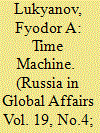

|
|
|
| 14 |
ID:
183405
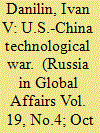

|
|
|
|
|
| Summary/Abstract |
The technological war, or Tech War, as part of the geopolitical conflict
between the United States and China raises a range of questions for
researchers, the most important one being the role of digital technologies
and markets in international relations and world politics. The article studies
the motives and objectives of the Tech War and its long-term effects using
available academic literature on sanctions and research data on the digital
economy and high-tech markets, including the political aspects of the
U.S.-China rivalry. Analogues from the Cold War and other conflicts suggest
that the economic purpose of the Tech War is to limit China’s capacity in the long term. However, the new realities transform both the instruments
and goals of the traditional superpowers’ economic withstanding. The
importance of information and communication technologies (ICT) and the
rise of the digital economy have made traditional geopolitical and market
(commercial) dimensions of the conflict intertwined with high technology
seen as a strategic resource and a separate area of conflict. As for the
role of digital technology in world politics, a reverse process is observed:
its importance is growing due to the traditional (geo)political factors,
including securitization of the digital sphere, enhanced by the narratives of
new technological revolutions. These factors increase the intensity of the
Tech War since competition in high-tech markets is perceived as a zero-sum
game. However, in the long term, the globalized, highly internationalized
nature of digital markets and technologies may lead to the normalization
of global processes and world politics.
|
|
|
|
|
|
|
|
|
|
|
|
|
|
|
|
|
|
|
|
|